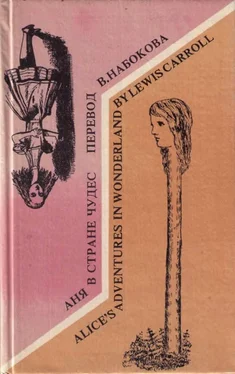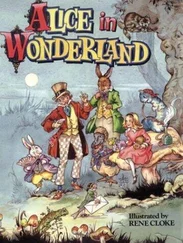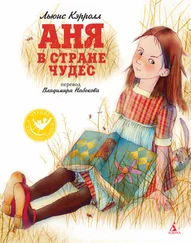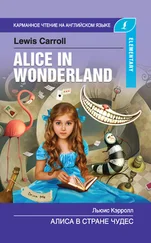«Will you walk a little faster?..» — в этой песенке Кэрролл использует размер и начало стихотворения «Паук и муха» популярной английской писательницы Мэри Хауитт (Магу Howitt, 1799–1888), которая в свою очередь использовала старую песню. Стихотворение Хауитт начиналось так:
«Will you walk into my parlour?» said the spider to the fly.
«’Tis the prettiest little parlour that ever you did spy.
The way into my parlour is up a winding stair,
And I’ve got many curious things to show when you are there.»
«Oh, no, no,» said the little fly, «to ask me is in vain,
For who goes up your winding stair can ne’er come down again.»
«Yes,» said Alice, «I’ve often seen them at dinn» — she checked herself hastily — добрая Алиса останавливается, ибо не хочет напоминать Черепахе Квази об обедах и о том, что на них едят («dinn» — это, конечно, «dinner»). Простодушный Квази воспринимает недоговоренное слово как название места («Dinn»).
«They have their tails in their mouths…» — племянник Кэрролла С. Д. Коллингвуд, написавший первую биографию писателя, приводит его слова: «Когда я это писал, я думал, что это так и есть, однако позже мне сказали, что торговцы рыбой пропускают хвост через глазное отверстие, а вовсе не засовывают его в рот» (S. D. Collingwood. The Life and Letters of Lewis Carroll, 1898).
«Do you know why it’s called a whiting?» — далее Кэрролл предлагает устами Грифона шутливую этимологию слова «whiting» (мерлан — рыба из семейства трески) и продолжает каламбурить. «Sole» — это, разумеется, «подметка» (башмака), но также «камбала» или «палтус», «eels» (Грифон, как и полагается простолюдину, не произносит звук [h]) — это и «heels», т. е. речь идет об «угрях» и «каблуках». «Porpoise» [’рэ: рэs] и «purpose» произносятся похоже, что дает возможность еще для одного каламбура: «I should say ‘With what porpoise?’ — Don’t you mean ‘purpose’?»
«Tis the voice of the Lobster…» — это стихотворение пародирует унылое стихотворение дидактического поэта Исаака Уоттса «Лентяй» (см. коммент. к с. 47, гл. II). Приведем его в оригинале:
’Tis the voice of the sluggard; I heard him complain,
«You have wak’d me too soon, I must slumber again.»
As the door, on its hinges, so he on his bed,
Turns his sides and his shoulders and his heavy head.
«A little more sleep, and a little more slumber,»
Thus he wastes half his days, and his hours without number,
And when he gets up, he sits folding his hands,
Or walks about sauntering, or trifling he stands.
I passed by his garden, and saw the wild brier,
The thorn and the thistle grow broader and higher;
The clothes that hang on him are turning to rags;
And his money still wastes till he starves or he begs.
I made him a visit, still hoping to find,
That he took better care for improving his mind:
He told me his dreams, talked of eating and drinking;
But he scarce reads his Bible, and never loves thinking.
Said I then to my heart, «Here’s a lesson for me,»
This man’s but a picture of what I might be:
But thanks to my friends for their care in my breeding,
Who taught me betimes to love working and reading.
«…And concluded the banquet by» — здесь естественно напрашивается: «eating the Owl».
«Beautiful Soup, so rich and green…» — 1 августа 1862 г. Кэрролл записал в своем дневнике, что сестры Лидделл пропели ему популярный романс «Вечерняя звезда» (Star of the Evening, words and music by James M. Sayles).
Beautiful star in heav’n so bright,
Softly falls thy silv’ry light,
As thou movest from earth afar,
Star of the evening, beautiful star.
CHORUS
Beautiful star,
Beautiful star,
Star of the evening, beautiful star.
In Fancy’s eye thou seem’st to say
Follow me, come from earth away.
Upward thy spirit’s pinions try,
To realms of love beyond the sky.
Shine on, oh star of love divine,
And may our soul’s affection twine
Around thee as thou movest afar,
Star of the twilight, beautiful star.
Слово pennyworth в пародии Кэрролла переносится со строки таким образом, что образует неожиданную составную рифму — «two р» — к слову «Soup».
«The Queen of Hearts…» — старинная детская песенка; впервые опубликована в 1782 г., но, безусловно, имела устное хождение гораздо раньше. Кэрролл не приводит второй строфы:
The King of Hearts
Called for the tarts
And beat the Knave full sore;
The Knave of Hearts
Brought back the tarts,
And vowed he’d steal no more.
«Fourteenth of March, I think it was,» he said: — вспомним, что часы у Шляпника отстают на два дня.
«Bring me the list of the singers in the last concert!» — Королева вспоминает эпизод, о котором шла речь во время Безумного чаепития (гл. VII), когда Шляпник пел так фальшиво, что вызвал ее гнев.
— and the twinkling of the tea — Шляпник вспоминает песенку, которую он пел: «Twinkle, twinkle, little bat…», но слегка путает слова.
Here one of the guinea-pigs cheered, and was immediately suppressed by the officers of the court — один из ярких примеров «реализации» переносного значения слова, которому находится вполне буквальное объяснение.
«If that’s all you know about it, you may stand down» — слова «you may stand down» представляют собой формулу, разрешающую свидетелю вернуться на свое место (он должен был спуститься с возвышения, где стоял во время дачи показаний). Формула эта также осмысляется буквально, т. е. «реализуется», в ответе Шляпника: «I can’t go no lower… I am on the floor, as it is.»
Читать дальше
Конец ознакомительного отрывка
Купить книгу












